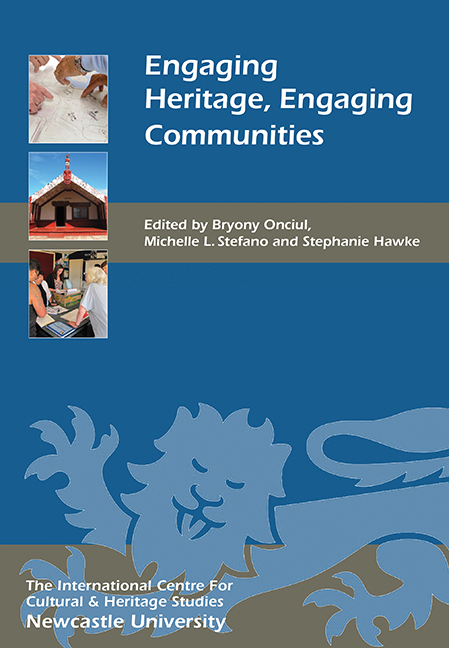Introduction
Published online by Cambridge University Press: 13 April 2017
Summary
Across the global networks of heritage sites, museums and galleries, the importance of communities to the interpretation and conservation of heritage is increasingly being recognised. Meaningful community engagement is noted as a worthy institutional goal and is a common requirement of funding bodies. Yet the very term ‘meaningful community engagement’ betrays a myriad of contrary approaches and understandings. Who is a community? How can they engage with heritage? Why would a community want to? How do communities and heritage professionals perceive one another? What does it mean to ‘engage’? These questions unsettle the very foundations of community engagement and indicate a need to unpick this important but complex trend.
Engaging Heritage, Engaging Communities critically engages with and explores the latest debates and practices surrounding community collaboration. By exploring the different ways in which communities participate in heritage projects, the book questions the benefits, costs and limitations of community engagement. Whether communities are engaging through innovative initiatives or in response to economic, political or social factors, there is a need to understand how such engagements are conceptualised, facilitated and experienced by both the organisations and the communities involved.
The terms that are central to this volume, ‘community’, ‘engagement’ and ‘heritage’, are key touchstones in the vocabulary of modern museology and heritage practice and theory. Yet they remain fluid, undefined terms with a multiplicity of logics and conceptions that range so broadly as to be entirely dissimilar. Engaging Heritage, Engaging Communities focuses upon untangling these terms and questioning the assumptions upon which community engagement is often built.
The use of the term ‘engaging’ in the book title, and subsequent subheadings, plays upon the multiple readings of the word. It relates directly to the process of working with, or co-producing, that is central to the analysis in the volume, but it also hints at the assumed attractive and compelling qualities associated with doing ‘good’ community work. It emphasises the way that this phenomenon of engagement has occupied and held the interest of academics and practitioners in the field of heritage, not as a fleeting fad but as a real shift in logic. While the word ‘engaging’ can be used positively, it can also describe more limiting and restricting forms of relationships.
- Type
- Chapter
- Information
- Engaging Heritage, Engaging Communities , pp. 1 - 8Publisher: Boydell & BrewerPrint publication year: 2017



